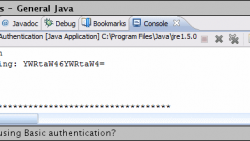curl是一个开源的用于数据传输的命令行工具与库,它使用URL语法格式,支持众多传输协议,包括:HTTP、HTTPS、FTP、FTPS、GOPHER、TFTP、SCP、SFTP、SMB、TELNET、DICT、LDAP、LDAPS、FILE、IMAP、SMTP、POP3、RTSP和RTMP。curl库提供了很多强大的功能,你可以利用它来进行HTTP/HTTPS请求、上传/下载文件等,且支持Cookie、认证、代理、限速等。 1. curl的使用 1.1 URL访问 访问一个网页时,可以使用curl命令后加上要访问的网址: $ curl justcode.ikeepstudying.com <html>…
Linux:cURL 命令详解,以及实例, curl auth, curl 模拟登陆,快速网站测压, curl 爬虫, curl Command Download File Example, How to quickly stress test a web server
linux curl是一个利用URL规则在命令行下工作的文件传输工具。它支持文件的上传和下载,所以是综合传输工具,但按传统,习惯称url为下载工具。
一,curl命令参数,有好多我没有用过,也不知道翻译的对不对,如果有误的地方,还请指正。
-a/--append 上传文件时,附加到目标文件
-A/--user-agent <string> 设置用户代理发送给服务器
- anyauth 可以使用“任何”身份验证方法
-b/--cookie <name=string/file> cookie字符串或文件读取位置
- basic 使用HTTP基本验证
-B/--use-ascii 使用ASCII /文本传输
-c/--cookie-jar <file> 操作结束后把cookie写入到这个文件中
-C/--continue-at <offset> 断点续转
-d/--data <data> HTTP POST方式传送数据
--data-ascii <data> 以ascii的方式post数据
--data-binary <data> 以二进制的方式post数据
--negotiate 使用HTTP身份验证
--digest 使用数字身份验证
--disable-eprt 禁止使用EPRT或LPRT
--disable-epsv 禁止使用EPSV
-D/--dump-header <file> 把header信息写入到该文件中
--egd-file <file> 为随机数据(SSL)设置EGD socket路径
--tcp-nodelay 使用TCP_NODELAY选项
-e/--referer 来源网址
-E/--cert <cert[:passwd]> 客户端证书文件和密码 (SSL)
--cert-type <type> 证书文件类型 (DER/PEM/ENG) (SSL)
--key <key> 私钥文件名 (SSL)
--key-type <type> 私钥文件类型 (DER/PEM/ENG) (SSL)
--pass <pass> 私钥密码 (SSL)
--engine <eng> 加密引擎使用 (SSL). "--engine list" for list
--cacert <file> CA证书 (SSL)
--capath <directory> CA目录 (made using c_rehash) to verify peer against (SSL)
--ciphers <list> SSL密码
--compressed 要求返回是压缩的形势 (using deflate or gzip)
--connect-timeout <seconds> 设置最大请求时间
--create-dirs 建立本地目录的目录层次结构
--crlf 上传是把LF转变成CRLF
-f/--fail 连接失败时不显示http错误
--ftp-create-dirs 如果远程目录不存在,创建远程目录
--ftp-method [multicwd/nocwd/singlecwd] 控制CWD的使用
--ftp-pasv 使用 PASV/EPSV 代替端口
--ftp-skip-pasv-ip 使用PASV的时候,忽略该IP地址
--ftp-ssl 尝试用 SSL/TLS 来进行ftp数据传输
--ftp-ssl-reqd 要求用 SSL/TLS 来进行ftp数据传输
-F/--form <name=content> 模拟http表单提交数据
-form-string <name=string> 模拟http表单提交数据
-g/--globoff 禁用网址序列和范围使用{}和[]
-G/--get 以get的方式来发送数据
-h/--help 帮助
-H/--header <line>自定义头信息传递给服务器
--ignore-content-length 忽略的HTTP头信息的长度
-i/--include 输出时包括protocol头信息
-I/--head 只显示文档信息
从文件中读取-j/--junk-session-cookies忽略会话Cookie
- 界面<interface>指定网络接口/地址使用
- krb4 <级别>启用与指定的安全级别krb4
-j/--junk-session-cookies 读取文件进忽略session cookie
--interface <interface> 使用指定网络接口/地址
--krb4 <level> 使用指定安全级别的krb4
-k/--insecure 允许不使用证书到SSL站点
-K/--config 指定的配置文件读取
-l/--list-only 列出ftp目录下的文件名称
--limit-rate <rate> 设置传输速度
--local-port<NUM> 强制使用本地端口号
-m/--max-time <seconds> 设置最大传输时间
--max-redirs <num> 设置最大读取的目录数
--max-filesize <bytes> 设置最大下载的文件总量
-M/--manual 显示全手动
-n/--netrc 从netrc文件中读取用户名和密码
--netrc-optional 使用 .netrc 或者 URL来覆盖-n
--ntlm 使用 HTTP NTLM 身份验证
-N/--no-buffer 禁用缓冲输出
-o/--output 把输出写到该文件中
-O/--remote-name 把输出写到该文件中,保留远程文件的文件名
-p/--proxytunnel 使用HTTP代理
--proxy-anyauth 选择任一代理身份验证方法
--proxy-basic 在代理上使用基本身份验证
--proxy-digest 在代理上使用数字身份验证
--proxy-ntlm 在代理上使用ntlm身份验证
-P/--ftp-port <address> 使用端口地址,而不是使用PASV
-Q/--quote <cmd>文件传输前,发送命令到服务器
-r/--range <range>检索来自HTTP/1.1或FTP服务器字节范围
--range-file 读取(SSL)的随机文件
-R/--remote-time 在本地生成文件时,保留远程文件时间
--retry <num> 传输出现问题时,重试的次数
--retry-delay <seconds> 传输出现问题时,设置重试间隔时间
--retry-max-time <seconds> 传输出现问题时,设置最大重试时间
-s/--silent静音模式。不输出任何东西
-S/--show-error 显示错误
--socks4 <host[:port]> 用socks4代理给定主机和端口
--socks5 <host[:port]> 用socks5代理给定主机和端口
--stderr <file>
-t/--telnet-option <OPT=val> Telnet选项设置
--trace <file> 对指定文件进行debug
--trace-ascii <file> Like --跟踪但没有hex输出
--trace-time 跟踪/详细输出时,添加时间戳
-T/--upload-file <file> 上传文件
--url <URL> Spet URL to work with
-u/--user <user[:password]>设置服务器的用户和密码
-U/--proxy-user <user[:password]>设置代理用户名和密码
-v/--verbose
-V/--version 显示版本信息
-w/--write-out [format]什么输出完成后
-x/--proxy <host[:port]>在给定的端口上使用HTTP代理
-X/--request <command>指定什么命令
-y/--speed-time 放弃限速所要的时间。默认为30
-Y/--speed-limit 停止传输速度的限制,速度时间'秒
-z/--time-cond 传送时间设置
-0/--http1.0 使用HTTP 1.0
-1/--tlsv1 使用TLSv1(SSL)
-2/--sslv2 使用SSLv2的(SSL)
-3/--sslv3 使用的SSLv3(SSL)
--3p-quote like -Q for the source URL for 3rd party transfer
--3p-url 使用url,进行第三方传送
--3p-user 使用用户名和密码,进行第三方传送
-4/--ipv4 使用IP4
-6/--ipv6 使用IP6
-#/--progress-bar 用进度条显示当前的传送状态
二,常用curl实例
1,抓取页面内容到一个文件中
[root@root mytest]# curl -o home.html http://justcode.ikeepstudying.com
2,用-O(大写的),后面的url要具体到某个文件,不然抓不下来。我们还可以用正则来抓取东西
[root@root mytest]# curl -O http://justcode.ikeepstudying.com/wp-content/uploads/2017/09/compare_varnish.jpg [root@root mytest]# curl -O http://justcode.ikeepstudying.com/wp-content/uploads/2017/[0-9][0-9]/aaaaa.jpg
3,模拟表单信息,模拟登录,保存cookie信息
[root@root mytest]# curl -c ./cookie_c.txt -F log=aaaa -F pwd=****** http://justcode.ikeepstudying.com/wp-login.php
4,模拟表单信息,模拟登录,保存头信息
[root@root mytest]# curl -D ./cookie_D.txt -F log=aaaa -F pwd=****** http://justcode.ikeepstudying.com/wp-login.php
-c(小写)产生的cookie和-D里面的cookie是不一样的。
5,使用cookie文件
[root@root mytest]# curl -b ./cookie_c.txt http://justcode.ikeepstudying.com/wp-admin
6,断点续传,-C(大写的)
[root@root mytest]# curl -C -O http://justcode.ikeepstudying.com/wp-content/uploads/2017/09/compare_varnish.jpg
7,传送数据,最好用登录页面测试,因为你传值过去后,curl回抓数据,你可以看到你传值有没有成功
[root@root mytest]# curl -d log=aaaa http://justcode.ikeepstudying.com/wp-login.php
8,显示抓取错误,下面这个例子,很清楚的表明了。
[root@root mytest]# curl -f http://justcode.ikeepstudying.com/asdf curl: (22) The requested URL returned error: 404 [root@root mytest]# curl http://justcode.ikeepstudying.com/asdf <HTML><HEAD><TITLE>404,not found</TITLE> 。。。。。。。。。。。。
9,伪造来源地址,有的网站会判断,请求来源地址。
[root@root mytest]# curl -e http://localhost http://justcode.ikeepstudying.com/wp-login.php
10,当我们经常用curl去搞人家东西的时候,人家会把你的IP给屏蔽掉的,这个时候,我们可以用代理
[root@root mytest]# curl -x 24.10.28.84:32779 -o home.html http://justcode.ikeepstudying.com
11,比较大的东西,我们可以分段下载
[root@root mytest]# curl -r 0-100 -o img.part1 http://justcode.ikeepstudying.com/wp- content/uploads/2017/09/compare_varnish.jpg % Total % Received % Xferd Average Speed Time Time Time Current Dload Upload Total Spent Left Speed 100 101 100 101 0 0 105 0 --:--:-- --:--:-- --:--:-- 0 [root@root mytest]# curl -r 100-200 -o img.part2 http://justcode.ikeepstudying.com/wp- content/uploads/2017/09/compare_varnish.jpg % Total % Received % Xferd Average Speed Time Time Time Current Dload Upload Total Spent Left Speed 100 101 100 101 0 0 57 0 0:00:01 0:00:01 --:--:-- 0 [root@root mytest]# curl -r 200- -o img.part3 http://justcode.ikeepstudying.com/wp- content/uploads/2017/09/compare_varnish.jpg % Total % Received % Xferd Average Speed Time Time Time Current Dload Upload Total Spent Left Speed 100 104k 100 104k 0 0 52793 0 0:00:02 0:00:02 --:--:-- 88961 [root@root mytest]# ls |grep part | xargs du -sh 4.0K one.part1 112K three.part3 4.0K two.part2
用的时候,把他们cat一下就OK了,cat img.part* >img.jpg
12,不会显示下载进度信息
[root@root mytest]# curl -s -o aaa.jpg http://justcode.ikeepstudying.com/wp-content/uploads/2017/09/compare_varnish.jpg
13,显示下载进度条
[root@root mytest]# curl -# -O http://justcode.ikeepstudying.com/wp-content/uploads/2017/09/compare_varnish.jpg ######################################################################## 100.0%
14,通过ftp下载文件
[justcode@ikeepstudying ~]$ curl -u 用户名:密码 -O http://justcode.ikeepstudying.com/demo/curtain/bbstudy_files/style.css % Total % Received % Xferd Average Speed Time Time Time Current Dload Upload Total Spent Left Speed 101 1934 101 1934 0 0 3184 0 --:--:-- --:--:-- --:--:-- 7136
或者用下面的方式
[justcode@ikeepstudying ~]$ curl -O ftp://用户名:密码@ip:port/demo/curtain/bbstudy_files/style.css
15,通过ftp上传
[justcode@ikeepstudying ~]$ curl -T test.sql ftp://用户名:密码@ip:port/demo/curtain/bbstudy_files/
16,Shell+Curl实现网页爬虫
用shell脚本和curl实现一个网络爬虫,主要功能是检测某个网站海贼王的更新信息,当有最新剧集更新时发送邮件提醒。作为对我的考验,刚开始我没有思路,学了一段时间的shell脚本,又从网上查了一些资料,但感觉没思路;后来问了一个软件学院的师兄,可以用正则表达式匹配出最大值,与上一次的值比较,大于则发送邮件。
#! /bin/bash
URL="http://www.fzdm.com/manhua/002/"
LOG_DIR=${HOME}/logs
#发送邮件函数
smail(){
mail -s "更新提醒" $MAIL << EOF
==================================
Report Time: `date +"%F %T"`
Current User: `whoami`
海贼王已经有更新,请打开下列链接前往观看!
风之动漫:
http://www.fzdm.com/manhua/002/
===================================
EOF
}
read -p "Please input your 163 mail: " MAIL
Result=`curl -o /dev/null -s -m 10 --connect-timeout 10 -w %{http_code} $URL`
Test=`echo $Result`
#监测网站是否可以正常访问
if [ "$Test" == "200" ]
then
if [ ! -f $LOG_DIR ]
then
mkdir -p $LOG_DIR
fi
cd $LOG_DIR
touch log.txt
let Value1=800 #现在最新是800话
while true
do
curl -s -o page.html http://www.fzdm.com/manhua/002/
#利用正则表达式获取HTML文件中最新的剧集的值
let Value=$(cat page.html |grep 'title="海贼王[0-9].*"' |sed -n '1p' |awk -F '"' '{print $4}' |cut -d '/' -f1)
if [ $Value -gt $Value1 ]
then
smail
echo "successfully! `date` " >> log.txt
let Value1=Value #更新最新的剧集
fi
rm page.html
sleep 300
done
fi
程序中用到mail命令,需要自己配置相应的环境,把要发送的内容封装起来,以EOF结尾。接受的邮箱可以自己定义。
The Curl syntax allows you to specify sequences and sets of URL’s. Say for example we’re going to run a load stress test against Google we can run…
curl -s "http://google.com?[1-1000]"
This will make 1000 calls to google i.e.
http://google.com?1 http://google.com?2 http://google.com?3 \... http://google.com?1000
So say you want to stress test your web application and it won’t complain if it’s fed an extra parameter, 10,000 calls could be done something like.
curl -s "http://yourappp.com/your_page_to_test.php?[1-10000]"
Multiple Pages
Easy just add each page to the command line.
curl -s "http://yourapp.com/page1.php?[1-1000]" "http://yourappp.com/page2.php?[1-1000]"
Or even…
curl -s "http://yourapp.com/page{1, 2}.php?[1-1000]"
Timing
Using the time command we can get a view on our performance
time curl -s "http://yourapp.com/page{1, 2}.php?[1-1000]"
real 0m0.606s
user 0m0.009s
sys 0m0.008s
Simulating consecutive users
OK, this is great for sending a whole bunch of calls one after the other but what about simultaneous calls. For this we can place the Curl calls in a script and set them running in the background. i.e. my_stress_test.sh
curl -s "http://yourapp.com/page{1, 2}.php?[1-1000]" &
pidlist="$pidlist $!"
curl -s "http://yourapp.com/page{1, 2}.php?[1-1000]" &
pidlist="$pidlist $!"
curl -s "http://yourapp.com/page{1, 2}.php?[1-1000]" &
pidlist="$pidlist $!"
curl -s "http://yourapp.com/page{1, 2}.php?[1-1000]" &
pidlist="$pidlist $!"
curl -s "http://yourapp.com/page{1, 2}.php?[1-1000]" &
pidlist="$pidlist $!"
curl -s "http://yourapp.com/page{1, 2}.php?[1-1000]" &
pidlist="$pidlist $!"
curl -s "http://yourapp.com/page{1, 2}.php?[1-1000]" &
pidlist="$pidlist $!"
for job in $pidlist do
echo $job
wait $job || let "FAIL+=1"
done
if [ "$FAIL" == "0" ]; then
echo "YAY!"
else
echo "FAIL! ($FAIL)"
fi
Then run time my_stress_test.sh
![]()





